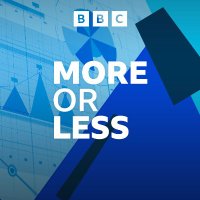
BBC More or Less
@bbcmoreorless
The BBC's More or Less: Tim Harford explains - and sometimes debunks - the numbers and statistics used in political debate, the news, and everyday life.
ID: 353655591
https://www.bbc.co.uk/programmes/b006qshd 12-08-2011 12:42:08
1,1K Tweet
27,27K Takipçi
118 Takip Edilen

Does the NHS have too many managers, or too few? Charlotte Wickens from the The King's Fund explains what’s what. bbc.co.uk/programmes/p0j…


“It's a horrible situation to be in.” - Paul Johnson Institute for Fiscal Studies on the fiscal challenges facing the next government. Listen here: bbc.co.uk/programmes/p0j…

“This is where it gets really scary exciting” - Professor Jouni Kuha LSE Statistics tells us how it feels in the final stages of the #exitpoll. Listen here: bbc.co.uk/programmes/p0j…

Is increasing turbulence making flying more dangerous? Prof Paul Williams explains what's going on. bbc.co.uk/programmes/p0j…

Do we eat a credit card’s worth of microplastics every week? “It was a very powerful message. But the problem is it's wrong,” says Prof Jamie Woodward The University of Manchester Find out why: bbc.co.uk/programmes/p0j…

A viral WhatsApp message says illegal migrants receive more in benefits than pensioners. Is that right? No says Claire Milne of Full Fact. Story No.1 on this week’s BBC Radio 4 More or Less: bbc.co.uk/programmes/p0j…

Energy Secretary Ed Miliband says the latest round of the renewable energy auction was “record-breaking”. That entirely depends which record you’re looking at. Story No.2 on this week’s BBC Radio 4 More or Less: bbc.co.uk/programmes/p0j…

“Most policy and most government, you would hope, is based on evidence. But it turns out often the evidence base is very, very thin”. David Halpern CBE of The Behavioural Insights Team explains the findings of his new report. Story No.4 on this week's More or Less: bbc.co.uk/programmes/p0j…

When trying to solve a problem “is like turning around an oil tanker”, that suggests it’s going to take a very long time. But how long does it actually take? Story No.5 on this week’s BBC Radio 4 More or Less. bbc.co.uk/programmes/p0j…

Did More or Less make a terrible mathematical error? We said 1 divided by zero was an impossible calculation. Our listeners said the answer was infinity. Katie Steckles explains why infinity is not the answer. Story No.3 on BBC Radio 4 More or Less: bbc.co.uk/programmes/p0j…

“Based on what you've told me, I don't think you really can reasonably extrapolate…” Tim Harford presses Andrew Amoils New World Wealth on how they worked out 9500 millionaires might leave the UK this year. Story 1 on this week’s BBC Radio 4 More or Less. bbc.co.uk/programmes/p0j…

How much do asylum seekers cost the state? Madeleine Sumption of MigrationObservatory explains how the number has gone up from £8000 per person per year in 2018/9 to nearly £21,000 in the latest figures. Story 2 in this week’s BBC Radio 4 More or Less. bbc.co.uk/programmes/p0j…

Has the NHS got a bad case of Baumol’s cost disease? Tim Harford explains with the help of a string quartet and Ben Zaranko of Institute for Fiscal Studies. Story 3 on this week’s BBC Radio 4 More or Less. bbc.co.uk/programmes/p0j…

“You are both absolute nerds.” Sam Freedman and Maxwell Marlow 🇺🇦 tell Tim Harford the rules for their somewhat intricate bet on the number of kids who will leave private school when VAT is introduced. Story 4 on this week’s BBC Radio 4 More or Less. bbc.co.uk/programmes/p0j…

Should the government target persnuffle? Ben Zaranko Institute for Fiscal Studies tells Tim Harford how Rachel Reeves could change the government's fiscal rule to allow more borrowing. bbc.co.uk/programmes/p0j…

"That is brilliant." Learn the maths hack from Rob Eastaway that blew the minds of Chris Mason and Tim Harford

